Lessons Learned from Outreach Mistakes
As an outreach specialist, I’ve tried a lot of new things over the years. Outreach is all about attention to detail, but that’s easier said than done. It is sometimes more valuable to learn from what hasn’t worked than to overanalyze steps that are currently working.

By working for a company that mainly does blog outreach to boost client rankings organically, we’ve struggled to find a system that works not only for our clients but also for bloggers. It really is a fine line that must be walked carefully. The majority of our mistakes, by far, have happened when reaching out to blog owners.
Understanding the Value of Guest Blogging
First, you need to realize the importance of guest blogging.
In the outreach world, it’s basically the be-all-end-all. Not only does guest blogging introduce your brand to an entirely new audience, but it creates relationships. High-quality blog posts are as good as gold on the internet, and this is why we are so valuable to clients.
A strong backlink profile is a key to growing page ranking in today’s crowded market, too, and monitoring backlinks is essential on your way to the top.
We produce high-quality blog posts, but the problem comes in communicating this value to potential guest blogs. It’s not as easy as you might think to land a blog post on some of the top publications, or even just up-and-coming blogs. You have to master the pitch so you can build authentic trust with the blogger or editor.
If you’re ready to learn how to write the best guest post pitches that actually get a response, keep reading!
An Experiment Failed is a Lesson Learned
Now that you understand just why outreach is so important, let’s get into our mistakes.
We aren’t perfect by any means, and these failures demonstrate just that. We’ve made a lot of dumb mistakes that are cringe-inducing just to look back on and think about. Luckily, we’ve learned from them.
The silver lining is that now we have built many quality relationships with bloggers in all industries across the globe. Without further ado, here are our worst experiments. Laugh at them or learn from them, but don’t repeat them!
Mistake #1. We sent generic emails
There is no one-size-fits-all when it comes to outreach. In the beginning, we thought we were being clever. It’s smarter to use the same emails every time, right? This saves us time since we don’t have to re-write emails with similar messaging to new bloggers. If we had success with one email format, why fix something that isn’t broken?
This burned more bridges than we’d care to admit. Bloggers get a lot of emails. We thought we were unique in the beginning as if the same bloggers hadn’t heard the same pitch 10 times already that month. Our cookie-cutter approach got us nowhere quickly. Frankly, it was insulting to the blogger, and it made it seem like we didn’t take them seriously.
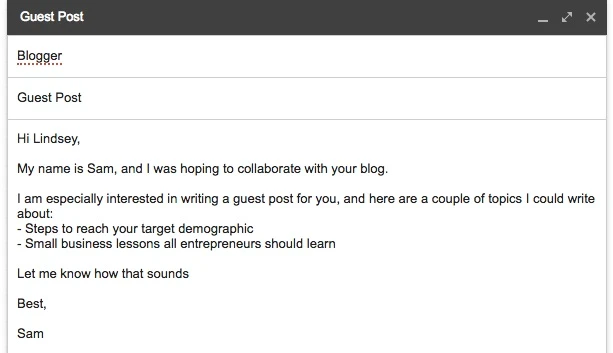
This email above could be to any blog, it’s not clear at all. It doesn’t give any information about who I am or what my company does. It doesn’t share my expertise. More importantly, it doesn’t show that I even know what this blog is about in the first place.
Instead of taking this one-size-fits-all approach, ditch the template altogether. Now, we write unique, individual emails every time. Yes, it takes more time, but it also yields better results. It’s far better to build an actual relationship than to save a few minutes.
Always look for a first name to direct the email to, and actually do your research about what type of content this blog posts. Performing an email lookup can help verify the authenticity and ownership of the email address before reaching out to a blogger. It can also provide additional context about the recipient, enabling a more personalized approach. Utilizing an email lookup tool to find email addresses is a recommended and reliable step in the outreach process. Start your emails by introducing yourself and who you are. When sending outreach from a fresh or low-activity inbox, running an email warm up service beforehand helps your messages land in the inbox while you build trust gradually.
It also helps to always end your outreach email with a clear and professional signature. A well-structured email signature reinforces credibility, makes it easy for the recipient to identify who you are, what you do, and where you work. You can use a free email signature creator to keep the information consistent across all emails.
Mistake #2. We tried too hard with our pitches
While we might not have actually been trying too hard, it certainly came across like we were.
As I’ve already said, bloggers get a lot of outreach emails either from guest posters or brands looking to work with them. They’re practically professionals when it comes to sniffing out a fake. See for yourself in this common example below.
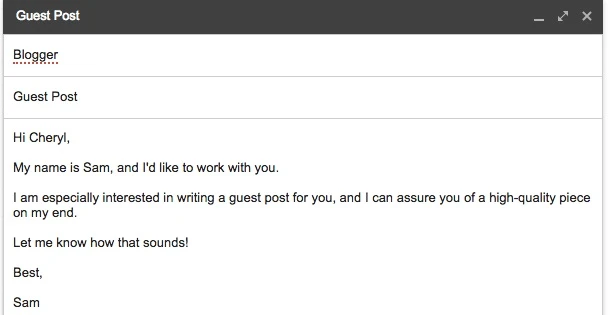
Believe it or not, we thought we were being polite with this type of email. We wanted to keep it short and sweet to show that we understood they had a lot on their plate. Instead, this comes across as rushed, vague, and too try-hard. We didn’t specify what we wanted to write about or why they should even consider us in the first place. The blogger might as well have received an email from a robot for as much personality we included.
Now, we know bloggers are more likely to respond to pitches that feel natural. Why would they want to accept a guest contributor who can’t even write an interesting email? You don’t want to be a robot. You’re a real person with real value to offer. Show it!
Mistake #3. We tried being overconfident
After working with many bloggers, we started to get cocky. We knew how valuable our guest writing services were for both bloggers and our clients, and we assumed the bloggers knew that too. They don’t, and nobody likes to feel talked down to, especially in an email. Looking back on this sample email makes me shudder now!
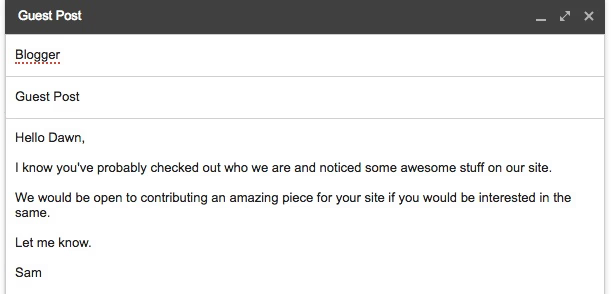
From this email, you’d think I was doing the blogger a favor by approaching them. Not only does this not make any sense, but it shows bad taste. The blogger is always doing the guest contributor a favor, not the other way around. Never assume the blogger knows who you are, even if you’re from one of the biggest publications on the web. Be humble and grateful.
Mistake #4. We didn’t include pitch ideas or topics
If there is one mistake you should never repeat, it’s this one. We would frequently send outreach emails that didn’t include any pitch ideas or potential topics. All we did was ask if the guest posting was a possibility and introduce ourselves. While this isn’t necessarily a dead end street, it’s not very effective.
This experiment was sprung from the idea that having the blogger help with the brainstorming of topics was beneficial for us both. The blogger could have a say, and we could be sure it was a strong fit.
This resulted in a lot of no-response emails. Bloggers get a lot of guest post pitches, so they’re not even going to bother responding to the ones that don’t seem thought out.
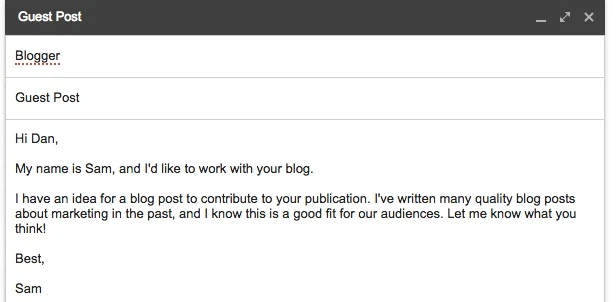
From this email, you have no idea what I’m trying to suggest. There is a vague mention of marketing blogs, but no concrete ideas. As you can imagine, we didn’t get any responses to these emails. Bloggers already have a lot on their plate. They don’t want to do the work for us, and they shouldn’t have to.
The best option is to create a short list of headlines and thought-out topic ideas to include in your email. This way, the blogger has a few options to choose from, and they don’t have to fill in any gaps.
Mistake #5. We tried sending several follow-up emails
Finally, our last and most awkward experiment involved follow-up emails. We would send requests and sometimes not hear back for a while. Meanwhile, we had clients asking for updates and wanting to see progress. We decided to try sending follow-up emails just in case the blogger missed our email, by chance.
Following up is a natural step in a lot of sales funnels, so this shouldn’t be different, right? Wrong. Blog authors are busy, and they probably can’t respond to all emails when they aren’t interested. Harassing the author did not help our chances of being accepted, no matter how polite we thought we were being.
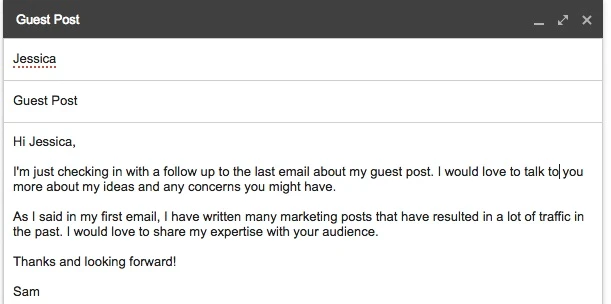
As you would expect, more than one follow up email lost its effectiveness. While there’s nothing horribly wrong with the email above, this isn’t a good way to get the bloggers attention. We discovered a happy medium. The most effective strategy is to send a single follow up a week after our initial email.
Sometimes bloggers do miss the initial email, and they might appreciate the second one. That being said, nobody likes being bombarded with daily emails. After the latter lack of response, we cut our losses and move on. That doesn’t mean we won’t approach them with a different topic somewhere else down the line, but we’ll assume they aren’t interested in that particular project.
Below is the type of email we’ll traditionally send for a follow-up. It’s short, sweet, and to the point. We don’t blame the blogger, and we also don’t harass them for more information. If they don’t respond, we call it a day. There are always more fish in the sea, and there might be a better time to pitch this blogger later.
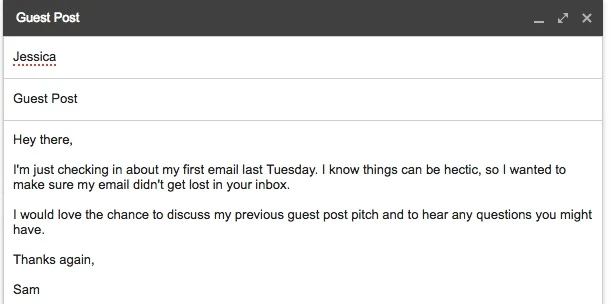
The perfect pitch is a balancing act. While I’d hate to say there’s a single formula for every outreach situation, I’ve found this one below to be the most successful:
- Greet the blogger by name.
- Introduce yourself by saying who you are, and why you’re a great fit as a guest contributor.
- Dive into the pitch. Lay out your topic ideas. The sweet spot is between 2-3.
- Link to guest posts you’ve done in the past that show your writing style.
- Let the blogger know how they can reach you.
- Thank them for their time.
- Follow up in a week if you don’t hear an initial response.
Here’s an example I’m making up to show you this formula in action:
Hi [Blogger],
I’ve been reading [Blog Name] since I stumbled upon your post [Post Name with Link] a few weeks ago. I noticed you accept guest contributors, and I think my expertise in WordPress development makes me a great fit. Currently, I blog at [Website Name], a WordPress front-end design blog which focuses on topics like plugins and security.
After looking at your blog, I realized you don’t have any posts about online security. As you know, cyber attacks are on the rise, and bloggers need to know how to protect their websites. Would these topics be of interest to you and your readers?
1. Cyber Security: 10 Tips for Protecting Your Blog from Hackers
- The Best WordPress Plugins for Securing Your Website
I’m always open to suggestions and input. Let me know what you think!
Thanks,
[Your Name with Contact Info]
See how this works?
I first establish trust and show why I have expertise that matters to this blogger’s audience. I made it clear I was familiar with the blogger’s work, and that I had a similar audience of my own. Finally, my pitches were easy to understand. I even showed I had done my research by taking the initiative to research the history of the topic on the publication. Altogether, this is a winning combination.
Mastering Blogger Outreach
As an agency that works with bloggers and business owners, we’ve come to learn a thing or two about both sides of this equation. We’ve clearly done some things wrong in the past that landed us in the doghouse with some bloggers, but now we’ve learned from these failed experiments. Now, we can use this information to move forward with our strategy.
We’re exploring new methods of outreach with clients like video blog posts, infographics, social media promotions. Especially with the rise of video, it’s important to support your strategy with online video content to boost your outreach efforts. So what can you do today to supercharge your own blog or website?
Start by looking for blogs that accept guest posts as well as finding your competitors backlinks to see where they’re writing guest posts. These will be easier to pitch to since they’re always looking for new topic suggestions. When writing your pitch, be specific. Know who you’re talking to and demonstrate that you understand their blog audience. Consider stepping outside the box by suggesting a video contribution, infographic, or unique guide.
If there’s a website you want to contribute to that doesn’t have formal requirements or guidelines, don’t let that deter you. Look for blogger or editor contact information, and go ahead and send your pitch anyway. Don’t be pushy, but show them you know what you’re talking about. You might just have an idea they’ve been waiting for.
One final word of advice: always follow through. Landing the pitch is only the first step. Once the blogger agrees with your topic suggestion, it’s time to put in the work. Always review your completed article for errors, and double check you’re providing actual value and experience. Be open to edits and comments from the blogger. If they like your work, you’re more likely to be able to continue contributing in the future.
The relationships we have been able to cultivate are strengthened because of our dedication to getting the outreach process just right. Whether you’re new to blogger outreach or you’re trying to add more backlinks to your arsenal, don’t make these same mistakes we did above.
Finding that sweet spot with your pitch takes time, and you shouldn’t rush the process. It’s better to be rejected and maintain your good relationship than to burn a bridge with a bad pitch.
Share with your fellow marketers and let us know your thoughts in the comments!
